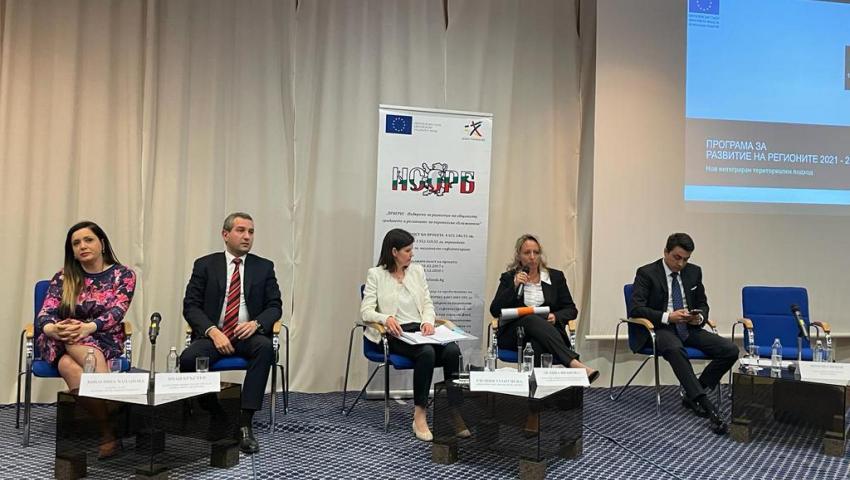BGN 7 billion of EU funds are provided for the municipalities under the new Regional Development Program

Source: Ministry of Regional Development and Public Works
BGN 7 billion in 7 years can be used by Bulgarian municipalities until 2027. The funds are provided in the Regional Development Program 2021-2027 (RDP), which is managed by the Ministry of Regional Development and Public Works (MRDPW). In addition, more than BGN 750m from the five cross-border co-operation programs with Greece, Turkey, Northern Macedonia, Serbia and Romania are awaiting joint projects in Bulgaria's border regions. The data was presented by the Deputy Minister of Regional Development and Public Works Deliana Ivanova during the regional meeting of mayors and chairmen of Municipal Councils from the South Central Planning Region, which took place in Plovdiv today.
The initiative central and local authorities in our country have secured access to another BGN 2.5 billion under other European programs for cooperation and good neighborliness, such as the Danube Program, Euro-MED Program, Interreg-Europe, URBACT, ESPON 2030 Program, Interreg Program "NEXT Black Sea Basin," said Deputy Minister Ivanova. According to her, the Bulgarian authorities, municipalities and enterprising business have never had greater access to the resource than European solidarity.
Only the most prepared and with a visionary approach will benefit from the opportunities provided and I urge all of you to seek information and take advantage of these opportunities, appeals Deliana Ivanova.
At the meeting with the mayors, she presented in detail the requirements of the Regional Development Program 2021-2027, so that the beneficiaries can now start preparing the projects for application.
The resource of BGN 7 billion is divided into four main priorities. The first of them is "Integrated Urban Development" worth BGN 1.047 billion. The ten largest municipalities in Bulgaria, which have been designated as growth centers, will compete for the distribution of this money. These are Vidin, Pleven, Ruse, Veliko Tarnovo, Varna, Burgas, Stara Zagora, Plovdiv, Sofia, Blagoevgrad.
There are two obligatory conditions that the local authorities must comply with in order to receive funding for the projects, Deputy Minister Ivanova emphasized. The first is that the measures they want to implement are provided for in the integrated development plans of the municipalities, which have been developed by the municipal authorities in compliance with the bottom-up approach when proposing projects.
The second condition is that the projects with which the municipalities will apply for funding for road infrastructure, education, health, social policy and culture, to correspond to the maps for the needs of the sector, prepared by the relevant state bodies and to be reflected in integrated development plans. The candidates from each of the municipalities decide for themselves which projects to apply for, the Deputy Minister added. The integrated territorial strategies for the development of the regions define the medium-term goals, priorities and perspectives for sustainable integrated regional and local development on the territory of the respective region for planning the creation of an attractive living environment.
Priority 2 "Integrated Territorial Development of the Regions" has allocated BGN 2.5 billion. 40 medium and large municipalities will fight for them. These are the municipalities: Vratsa, Lovech, Lom, Montana, Troyan, Gabrovo, Gorna Oryahovitsa, Sevlievo, Razgrad, Svishtov, Silistra, Dobrich, Targovishte, Shumen, Sliven, Yambol, Nova Zagora, Aytos, Karnobat, Kazanlak, Svilengrad, Harmanli, Dimitrovgrad, Kardzhali, Haskovo, Asenovgrad, Velingrad, Smolyan, Pazardzhik, Peshtera, Panagyurishte, Karlovo, Botevgrad, Gotse Delchev, Dupnitsa, Kyustendil, Pernik, Petrich, Samokov and Sandanski.
This resource can be upgraded with funding from almost all other European programs, except for three of them - the Transport Connectivity Program, the Food and Material Assistance Program and the Technical Assistance Program.
In the third priority "Fair Energy Transition" BGN 3.2 billion have been provided, and they are provided for the districts of Pernik, Kyustendil and Stara Zagora. The aim is to make a smooth transition from coal-fired power plants to green energy. This part of the RDP will start at a later stage of the program so that all clarifications on these specific objectives can be completed.
What is new in the Regional Development Program 2021-2027 (RDP) is that it will finance the implementation of integrated territorial investment (ITI). They are an instrument of Cohesion Policy, which is being introduced in Bulgaria for the first time during the current programming period, said Deliana Ivanova. She explained that the EU aims to support proposed bottom-up projects. Local stakeholders will have a leading role in proposing projects, so that the most important investments for the respective territory can be identified and implemented. Priority in ITI will be the economic orientation, which opens the possibility for the hybrid financing with other programs. Priority in the evaluation of proposed investments will be given to projects initiated by more than one stakeholder in the region. The goal is to achieve supra-municipal significance for any investment, the deputy minister said.
Deliana Ivanova also presented the opportunities for municipalities under the National Plan for Reconstruction and Sustainability. This is the measure for Support for sustainable energy renovation of the residential and non-residential building stock - renovation of public buildings in the country and renovation of buildings for production, trade and services.
An attractive scheme under the National Plan for Reconstruction and Development is Green Mobility. This is a pilot measure to support sustainable urban mobility through measures to develop environmentally friendly, safe, functional and energy efficient transport systems. It envisages the supply of zero-emission urban and interurban public transport vehicles, the construction of charging stations, the development of integrated transport systems to improve the efficiency of public transport and the introduction of safe urban mobility measures aimed at vulnerable pedestrians and cyclists, explained Deliana Ivanova.
